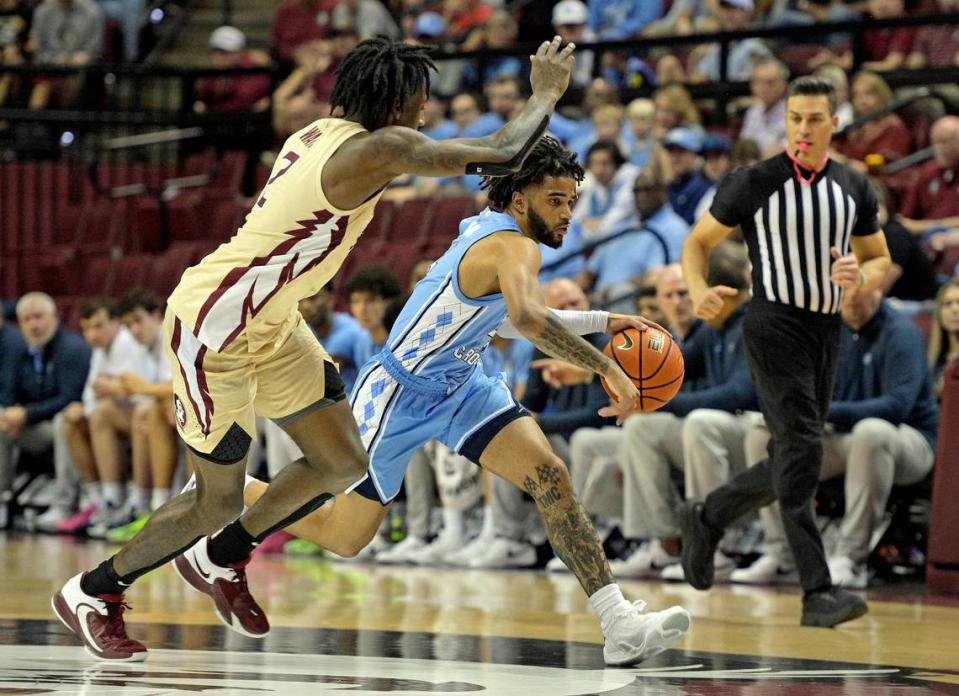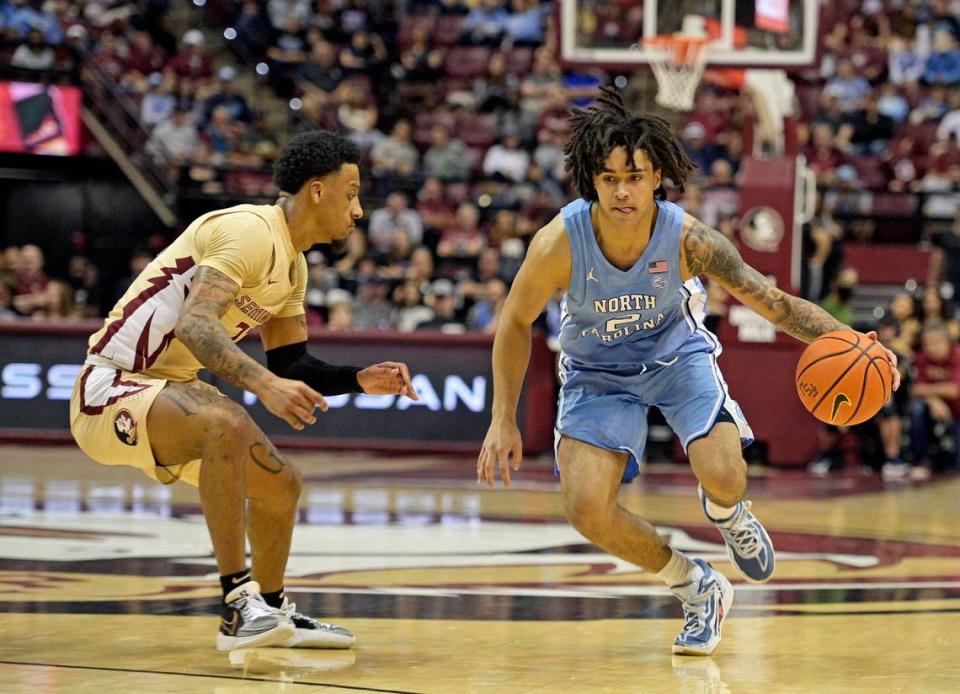UNC basketball tops Florida State. Takeaways from Tar Heels’ 75-68 win over Seminoles
With 33 seconds left on the clock, Harrison Ingram blocked Jamir Watkins’ layup, effectively icing North Carolina’s comeback.
No. 3 UNC (17-3, 9-0 ACC) defeated Florida State (12-8, 6-3 ACC), 75-68, on the road in a battle between the top teams in the league.
The Heels said admittedly it wasn’t the best win — they’ve said that several times this season — but it was one they could be proud of. Carolina struggled in the first half and trailed at the break for the second straight game. It responded in a big way after the break and outscored the Seminoles 39-27. The Tar Heels have outscored their last eight opponents by a combined 85 points.
“Coach [Hubert] Davis always talks about our response and living in the trenches. This was one of those types of games,” senior RJ Davis said. “I’m enjoying it because it’s basketball. They’re not always gonna be pretty, not always gonna be blowout games. I think those types of games like today’s game prepares us for what’s about to happen in March because all of our March games are living in the trenches.”
Four of the five starters finished in double figures.
RJ Davis contributed 24 points on 9-of-18 shooting and three rebounds. It was the 16th time he led the team in scoring this season and 13th time he scored 20 points or more.
Ingram, a junior, continued his impressive campaign, scoring 13 points and pulling down 17 rebounds. Ingram logged his third consecutive double-double, and he’s had 10 or more rebounds in six of the last eight games.
Freshman Elliot Cadeau scored a career-high 16 points and graduate student Cormac Ryan added 10 points and five boards.
FSU limited graduate student Armando Bacot’s efficiency, but he added five points and four rebounds. Three rebounds came on the defensive end, making him the first Tar Heel in history to record 1,000 defensive boards.
“I think we all trust each other. We all know how good everybody is, so we just have a lot of confidence in ourselves,” Cadeau said. “We feel like we’ve got a lot of good players off the bench, we’ve got our starters. Everybody’s really, really elite. We’re always just confident that we’re going to end up winning the game, because we feel like there’s not a team better than us in the country.”
It was the Tar Heels’ 10th straight victory. It was also the first 9-0 start in the conference since 2001, and they became the first team to hit 750 regular-season ACC games.
Here are three takeaways from the win.
Turnover trouble
North Carolina knew turnovers would likely play a role against Florida State, but their numbers were worse than expected. UNC committed 17 total turnovers, tying its season high originally set against Kentucky.
UNC took an 11-point lead just 6:31 into the game — Ingram and RJ Davis made four 3s during that period — and looked like it could break away early. The Tar Heels instead saw that lead dwindle after committing 12 first-half turnovers and making 11 field goals. FSU scored 19 points off those turnovers.
Meanwhile, Carolina made just two baskets in the final eight minutes and seven turnovers.
The Tar Heels cleaned things up in the second half, but the Seminoles scored 26 points off Carolina miscues. UNC by comparison forced 14 FSU turnovers and created 12 points.
It can’t be blamed on anyone in particular, either. Eight different Tar Heels committed a turnover, with RJ Davis leading the team at four.
“The thing that we talked about before the game was: Don’t let their pressure dictate and decide how we play and how effective we are on the offensive end,” Hubert Davis said. “I felt like their pressure dictated and decided how, how we executed. Whether our drives, our cuts or whatever, we were just too fast. As a result, we were turning the ball over. … We want to play with pace, but there’s a purpose in the pace and I felt like we got back to that in the second half.”
The Tar Heels entered the game ranked No. 21 in the nation in turnover percentage (14.3%), according to KenPom.com. In the first matchup between the two teams, UNC finished with 13 total turnovers. With 17 on Saturday, that number will certainly increase after its trip to Tallahassee.
Cadeau contributes in a big way
Freshman Cadeau had challenges with consistency earlier this season, but he’s started to feel more comfortable on the floor. Cadeau contributed a career-high 16 points for his second straight game in double figures; it was the first time he’s logged double figures in consecutive contests.
He found success driving into the lane, scoring on three layups. He also muscled his way into the paint for the foul contact, scoring eight from the charity stripe.
Cadeau contributed six assists as well. One of his most memorable plays came at 16:11 in the first half. He drove into the lane before kicking the ball out to Ingram for a 3-pointer at the top of the key.
“I’m just getting more confident in myself, and I’m figuring out how to get my shots within the playstyle without forcing anything,” Cadeau said. “I think [that comes from] the coaches trusting me more, putting the ball in my hands more and calling sets that actually get me downhill.”
Locked down on defense
The Tar Heels didn’t have a great first half, as seen by their turnover numbers. However, they also gave up 41 points in the first half, the second most this season and the most in ACC play.
That happened by allowing the Seminoles to score 50% from the field and 58.3% from long range. RJ Davis said the team did a poor job of taking care of the ball and compounded the issues with ineffective guarding.
At the under-eight timeout, Carolina had outscored the Seminoles 30-18. Though FSU came back to cut UNC’s lead to two points with less than 2:36 remaining, the Heels ratcheted up the intensity. They forced three straight Florida State misses, picked up four rebounds and added Ingram’s game-changing block.
Carolina held Florida State to 36.7% from the field and 25.0% from 3-point range in the second half, which directly led to better outcomes on the other end of the floor.
“We kept our composure and were able to get stops,” RJ Davis said. “Then when we got stops, we were able to convert.”






